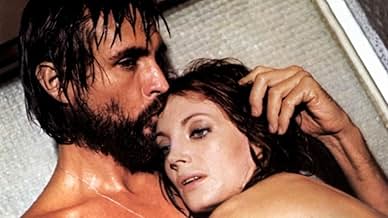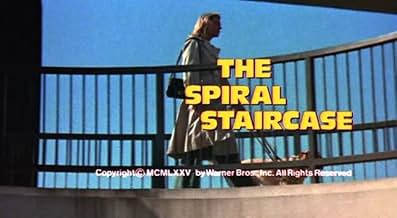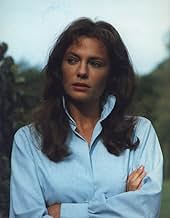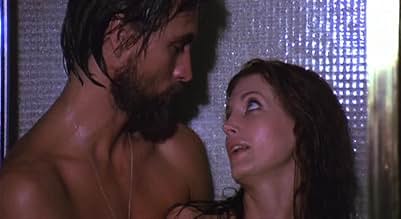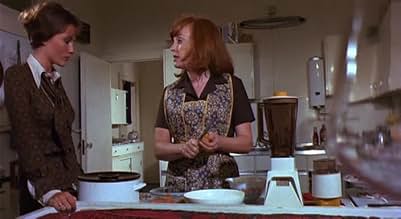Helen ha sido incapaz de hablar desde que vio morir a su esposo- ¿será una nueva víctima del asesino en serie trastornado que ataca a personas discapacitadas?Helen ha sido incapaz de hablar desde que vio morir a su esposo- ¿será una nueva víctima del asesino en serie trastornado que ataca a personas discapacitadas?Helen ha sido incapaz de hablar desde que vio morir a su esposo- ¿será una nueva víctima del asesino en serie trastornado que ataca a personas discapacitadas?
- Dirección
- Guionistas
- Elenco
- Steven
- (as John Philip Law)
- Visitor
- (sin créditos)
- Police Photographer
- (sin créditos)
Opiniones destacadas
Helen Mallory (Jacqueline Bisset) has been unable to speak since she witnessed her husband and child being killed in a house fire. Her doctor, Dr Rawley (John Ronane), has tried for several years to help her recover her speech but without success. He is very concerned for Helen's safety, as a serial killer has recently been at work in the city and all the victims share one thing in common they are all disabled in some way. Helen goes away to her uncle's nearby mansion, which also doubles as an institution for the handicapped. Here she finds herself in the company of her uncle Joe Sherman (Christopher Plummer), his secretary and lover Blanche (Gayle Hunnicut), angry brother Steven Sherman (John Philip Law), a strict nurse (Elaine Stritch), housekeepers Mr and Mrs Oates (Ronald Radd, Sheila Brennan) and the ill, old bed-bound Sherman mother (Mildred Dunnock). A ferocious thunderstorm plunges the house into a power-cut, and before long it becomes apparent that the serial killer who has been preying upon handicapped women is one of those trapped inside the mansion. It is now Helen who finds herself next on the killer's list, unless she can find a way to survive .
This is such a reliable, some might say "archetypal", story that all it needed was some thoughtful lighting and a well-judged sense of pace in order to work. But sadly director Collinson has spent too much time setting up pointless and weird camera angles instead of concentrating on the basics of suspense. If he had gone for the afore-mentioned thoughtful lighting and the better-judged sense of pace, this would have emerged a half-decent remake. The actors seem indifferent towards the material and give performances way below their best. Bisset has the difficulty of contending with a wordless role and is nothing more than average in the part; Plummer looks rightfully bored as the professor; Law snaps and snarls ineffectually as his bad-tempered brother; Dunnock spends most of the film acting drugged as the poorly old mother of the clan. For a good hour or so, very little happens in the film and one invariably finds oneself staring vacantly at the screen, waiting with misplaced optimism for a flash of suspense. Not even the music by David Lindup manages to generate any excitement or atmosphere. When the killings finally begin and Helen goes on the run in the dark passages of the house, trying to escape from her murderous assailant, the sequence is done rather flatly with little in the way of true excitement. If you're planning on watching a version of The Spiral Staircase some time soon, the best advice I can give is that you stick with the vastly superior original!
Pointless redo. The original is a classic--what's the point or remaking it? I caught this on TV late at night back in the 1970s. I had seen the original and was interested in seeing how this stood up. Sadly it turned out to be pretty bad. Despite a great cast (Bisset, Christopher Plummer, John Phillip Law, Elaine Stritch) this is pretty slow-moving and dull. There's virtually no suspense or atmosphere and it looks like it was made on a very low budget which hurts. The cast tries their best but even their considerable talents can't liven this up. You can safely skip this one. See the original.
I give it a 3 because the cast does try and Bisset looks stunning (as always).
However, there was one thing that I derived from the movie. Christopher Plummer's character in one scene talks about no tolerance for imperfection. We in the 21st century have taken that to the extreme. We want everyone made up so that they all look the same, we go for style over substance, and more. Then again, I'm probably reading too far into the movie, as it was most likely intended as a straight thriller (although it doesn't really thrill).
Anyway, it's a mediocre way to pass time. Also starring Elaine Stritch and John Philip Law (the "Barbarella" angel).
To make things worse, the film stars that store mannequin, John Phillip Law. Ugh.
The highlight is Elaine Stritch. She has the best lines and provides much needed comic relief. Unfortunately, there isn't enough of her.
Even though this review is long enough, imdb is requiring 600 characters now. What are we supposed to do? Describe every scene?
"GASP! Oh, it's only you! You startled me. Say, what are you doing down here? No...don't come any closer! No...no.... NOOOOOOOOOOOOOOOOOO!" *gets murdered*
The performances are mediocre. Christopher Plummer is one of those actors who can turn in amazing work when he cares. Here, he doesn't seem to. Jacqueline Bissett is, frankly, quite forgettable in the lead role. When actors don't have dialogue to lean on, they sure had better be charismatic and expressive; as the mute Helen, the wooden Bissett is just not up to the challenge. Mildred Dunnock, as the family matriarch on her deathbed, is probably the strongest member of the cast.
What else is there to say? It's a mess, and not a very interesting one. Helen's backstory, in which her husband and daughter died in a fire, doesn't add up to much, and the flashbacks are so ridiculous they're hard to take seriously. The music is standard. I can't take pride in having guessed the identity of the killer early on, but I think I would have guessed it just as easily even had I not seen the 1946 version. The best idea in the movie is a sequence (I don't remember if this was included in prior versions and haven't read the novel) in which Helen, being stalked through the house by the now-unmasked killer, finds that Mrs. Oates, the housekeeper, is unable to help her--not because she is dead or incapacitated, but merely because she is too drunk to take the events seriously.
¿Sabías que…?
- TriviaThird of four versions of "The Spiral Staircase." The first was La escalera de caracol (1946), the second was The Spiral Staircase (1961), made for television, and the fourth was The Spiral Staircase (2000), also for television.
- ErroresTodas las entradas contienen spoilers
- Citas
Blanche: Do you know that we have four hundred and eighty-five applications for next year's course already?
Dr. Sherman: You know, I swear if I propose to you, you'd file it under "applications".
Blanche: [pulling a book from the shelf and clearing her throat before she starts to read aloud] On page eighteen, chapter three, rule four: "Many a good secretary has married her boss. No good boss has ever married his secretary." Quote, unquote.
Dr. Sherman: [pointing to the now closed book in her hands] I wrote that before you came in.
Blanche: Why don't we go have a drink to that.
- ConexionesRemade as The Spiral Staircase (2000)
Selecciones populares
- How long is The Spiral Staircase?Con tecnología de Alexa
Detalles
- Tiempo de ejecución
- 1h 29min(89 min)
- Mezcla de sonido
- Relación de aspecto
- 1.78 : 1

